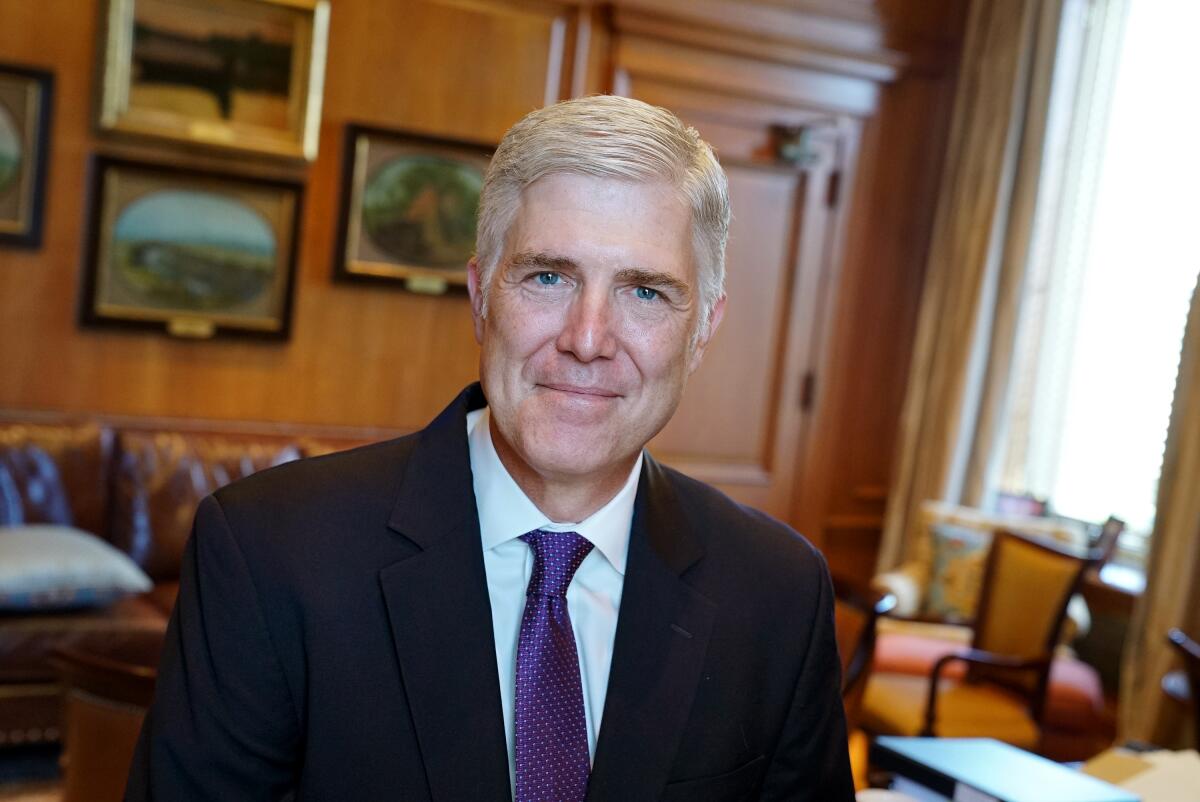Justice Gorsuch book touts Scalia’s views and civility in the Trump era

WASHINGTON — Thirty years ago, Neil Gorsuch was in his first year at Harvard Law School when Justice Antonin Scalia, then new to Supreme Court, came to lecture.
“It was a breath of fresh air, inspiring, like little I had heard in my classes,” Gorsuch writes in a new book. “We were told [in classes that] the Constitution is a ‘living’ document,” and judges were supposed to decide cases by updating the law to reflect the more enlightened views of today, he recalled.
But Scalia rejected that view and argued judges should not act as politicians by changing the law in the guise of interpreting it.
Gorsuch said he was ultimately won over by Scalia’s views rather than those of the Harvard faculty.
Two years ago, President Trump appointed Gorsuch to the seat left vacant by Scalia’s death. And now at age 52, Gorsuch is the youngest member of the high court.
This week, he is publishing a 323-page book of essays and articles that set out his views on the role of judges, the importance of civility and ethics, and the right -- and wrong -- way to decide cases.
Above all, he makes clear he is committed to Scalia’s view that the justices should rely on the “original meaning” of the words in the Constitution and in federal laws when deciding cases. They should not act as “social engineers” or reformers.
“I came to realize that when judges abandon the original meaning of a law to pursue some other goal they find worthy, they risk exercising political will rather than legal judgment,” he writes.
Like Scalia, Gorsuch seems determined to be heard beyond the court. Over his nearly 30-year career, Scalia became a conservative icon and had a powerful influence on legal thinking. He wrote sharply worded opinions and dissents, and he traveled regularly to speak at colleges and law schools.
Gorsuch writes clear opinions that are easy to read, but without the sarcastic jabs and scornful put-downs that were characteristic of Scalia. His tone is earnest and idealistic -- in the courtroom and in his book -- and he frets about the decline of civility in public life.
“To be worthy of our freedoms, we all have to adopt certain civil habits that enable others to enjoy them too,” he writes. “That means tolerating those who don’t agree with us or whose ideas upset us ... and listening and engaging with the merits of their ideas rather than dismissing them because of our own preconceptions.... In a very real way, self-governance turns on our treating each other as equals -- as persons, with the courtesy and respect each person deserves -- even when we vigorously disagree.”
He makes no mention of Trump, except to thank him for being gracious to him and his wife at the time of his nomination. Gorsuch also steers clear of the most disputed issues before the court, such as abortion, gay rights and gun rights.
In recent years, other justices have published memoirs about their early years: Clarence Thomas on growing up in poverty in Georgia in “My Grandfather’s Son”; Sonia Sotomayor on growing up in a Puerto Rican family in the Bronx in “My Beloved World”; and before that, Sandra Day O’Connor on growing up on a cattle ranch in the desert Southwest in “Lazy B.” In 2016, Justice Ruth Bader Ginsburg published “My Own Words,” a collection of speeches, articles and tributes she delivered over her long career.
Gorsuch’s book, “A Republic, If You Can Keep It,” includes speeches and articles, but he focuses on current legal debates and the work of the court, reprinting portions of his opinions. The title is a reference to Benjamin Franklin’s comment upon leaving the Constitutional Convention.
The strongest words in Gorsuch’s book come in his defense of “originalism” against the charge that it is a sham and a formula for conservative rulings. “Rubbish. Originalism is a theory focused on process, not on substance. It is not ‘Conservative’ with a big C focused on politics. It is conservative in the small c sense that it seeks to conserve the meaning of the Constitution as it was written,” he writes.
In an interview, Gorsuch acknowledged that scholars and historians, like the justices, often disagree about the meaning of the Constitution’s words and phrases. In 2008, for example, the justices split 5-4 on the meaning of the 2nd Amendment. Scalia, for the majority, said English and early American history made clear that the right to “bear arms” meant individuals had a right to keep firearms for the defense of themselves and their community. Justice John Paul Stevens in dissent said James Madison, the sponsor for the Bill of Rights, viewed the 2nd Amendment as preserving a state’s right to maintain a “well-regulated militia.”
There is “often not a single right answer,” Gorsuch said. “It requires judgment.” But he said the justices should start with the best understanding of the Constitution’s words.
Gorsuch said he came to know Scalia better when the justice came to Colorado and they went fly fishing. “I soon came to learn that, while we might hold similar views on judging, Justice Scalia and I had very different views about fishing.”
Gorsuch said he suggested gently “unfurling a line in the direction of a rising trout. Justice Scalia preferred another approach: lashing the stream with the enthusiasm of a son of Queens. When I pointed to a spot likely to harbor trout, he would storm over in his waders, look around, and then exclaim, ‘But you said there would be fish here!’ As indeed there had been.”
More to Read
Get the L.A. Times Politics newsletter
Deeply reported insights into legislation, politics and policy from Sacramento, Washington and beyond. In your inbox three times per week.
You may occasionally receive promotional content from the Los Angeles Times.











